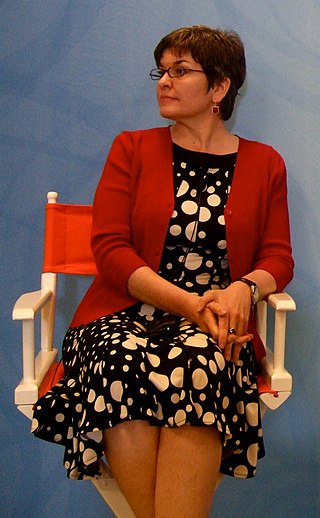Lotus Software was an American software company based in Massachusetts; it was sold to India's HCL Technologies in 2018.
TechTV was a 24-hour cable and satellite channel based in San Francisco featuring news and shows about computers, technology, and the Internet. In 2004, it merged with the G4 gaming channel which ultimately dissolved TechTV programming. At the height of its six-year run, TechTV was broadcast in 70 countries, reached 43 million households, and claimed 1.9 million unique visitors monthly to its website. A focus on personality-driven product reviews and technical support made it a cultural hub for technology information worldwide, still existing today online through its former hosts' webcasts, most notably the TWiT Network.

Ziff Davis, Inc. is an American digital media and internet company. Founded in 1927 by William Bernard Ziff Sr. and Bernard George Davis, the company primarily owns technology- and health-oriented media websites, online shopping-related services, internet connectivity services, gaming and entertainment brands, and cybersecurity and martech tools. Previously, the company was predominantly a publisher of hobbyist magazines.

ZDNET is a business technology news website owned and operated by Ziff Davis. The brand was founded on April 1, 1991, as a general interest technology portal from Ziff Davis and evolved into an enterprise IT-focused online publication. After being under the ownership of CNET Networks (2000–2008), CBS Corporation/ViacomCBS (2008–2020), and Red Ventures (2020–2024), ZDNET was reacquired by Ziff Davis in August 2024. CNET was included in the acquisition as well.

WGBH-TV, branded GBH or GBH 2 since 2020, is the primary PBS member television station in Boston, Massachusetts, United States.

PC/Computing was a monthly Ziff Davis publication that for most of its run focused on publishing reviews of IBM-compatible hardware and software and tips and reference information for users of such software and hardware.

The WGBH Educational Foundation, doing business as GBH since August 2020, is an American public broadcasting group based in Boston, Massachusetts. Established in 1951, it holds the licenses to all of the PBS member stations in Massachusetts, and operates its flagship station WGBH-TV, sister station WGBX-TV, and a group of NPR member stations in the state. It also owns WGBY-TV in Springfield, which is operated by New England Public Media under a program service agreement.

Dan Rosensweig is an American business executive who is chairman, president and former chief executive officer (CEO) of student services company Chegg. Previously, Rosensweig served as president and CEO of Guitar Hero; COO at Yahoo!; president of CNET, and president and CEO of ZDNet.

James Louderback is the CEO of VidCon, and was previously the CEO of Revision3. He has had numerous jobs in media companies involved in technology, most notably with TechTV and editor-in-chief of PC Magazine. He is also well known as the television host of TechTV's Fresh Gear for three years from 1998 to 2000.
Eckhard Pfeiffer is a businessman of German ancestry, who served as president and CEO of Compaq from 1991 to 1999. He was named as one of Time's "Cyber Elite Top 50" for 1998.
A month of bugs is a strategy used by security researchers to draw attention to the lax security procedures of commercial software corporations.
CNET is an American media website that publishes reviews, news, articles, blogs, podcasts, and videos on technology and consumer electronics globally. CNET originally produced content for radio and television in addition to its website before applying new media distribution methods through its internet television network, CNET Video, and its podcast and blog networks.

David Allen Gewirtz is a journalist, author, and U.S. policy advisor working in technology and national security policy. He currently serves as director of the U.S. Strategic Perspective Institute.
Edward M. Esber, Jr. is semi-retired in Park City, Utah. Ed spends his time helping the State of Utah, Utah Law enforcement and the Silicon Slopes entrepreneur community in Utah.

Alfred R. Kelman is an American film and television documentary producer and director, renowned for his work on The Body Human and the 1984 television adaptation of A Christmas Carol, starring George C. Scott.

Mary Jo Foley is an American freelance technology writer, author, podcaster and news editor. She regularly writes news, previews, and reviews for Microsoft's strategy, products and technology. Foley has been covering news on Microsoft Windows, and previously on Unix-related technology, since 1983, for publications including ZDNet, eWeek, Baseline, Redmond magazine,PC Magazine, and Directions on Microsoft.

Gina Smith is an American entrepreneur, author, and journalist who co-wrote Steve Wozniak's 2006 autobiography iWoz. In 2001, Smith was named one of the 100 most influential people in technology by Upside magazine.

Aox Inc. was a privately run American technology corporation founded by Michael and Linda Aronson in 1978. Over the course of its 22-year lifespan, the company chiefly developed software and hardware for IBM's PC and compatibles, for the Personal System/2, and for the Macintosh. In its twilight years, the company designed multimedia and teleconferencing devices and chip designs. Aox was founded after Michael Aronson graduated from Harvard University with a doctorate in physics; he stayed with the company until 2000, when he incorporated EndPoints Inc. and switched to full-time fabless semiconductor design.

Cumulus Corporation was an American computer peripheral and system manufacturer active from 1987 to 1993. Based in Beachwood, Ohio and started by Tecmar founder Martin Alpert, the company set out to exclusively manufacture expansion products for IBM's Personal System/2 (PS/2) family of computers—mainly RAM expansion cards. It later released cross-platform CPU upgrade cards and memory expansion cards for other platforms besides the PS/2. Beginning in 1990, the company began trading as Cumulus Computer Corporation and began releasing complete systems of their own. Initially a success story for the tech industry in Cleveland, a botched stock launch in 1992 proved disastrous for the company's ailing cash flow situation, and in 1993 the company was liquidated amid massive debt to suppliers and lenders.













